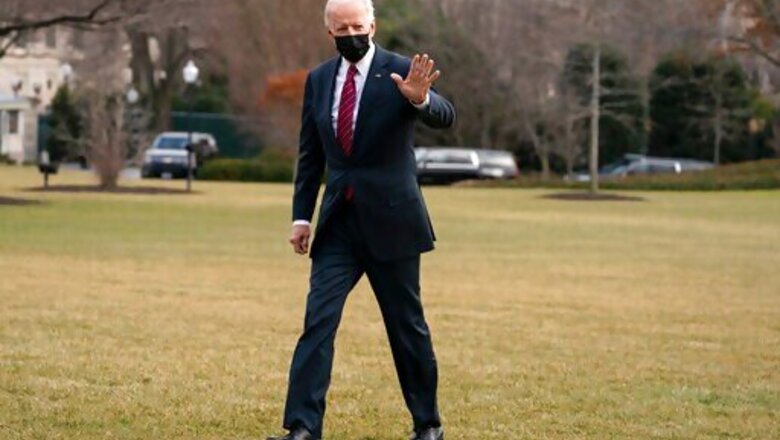
views
WASHINGTON: President Joe Biden and a group of 10 Senate Republicans have offered competing proposals to help the United States respond to the coronavirus pandemic and provide economic relief to businesses and families.
The president is meeting with the senators on Monday at the White House in what press secretary Jen Psaki described as an exchange of ideas” and not a forum for Biden to make or accept an offer.” Meanwhile, Democratic leaders in Congress are laying the groundwork for taking up Biden’s proposal in the coming weeks.
The topline numbers are this: Bidens plan calls for an additional $1.9 trillion in federal spending. The 10 GOP senators are calling for about $618 billion in federal spending.
The aid would come on top of the $900 billion coronavirus package that Congress passed in December and the $2.2 trillion package passed in March.
A look at the major differences:
AID TO INDIVIDUALS
Biden is proposing $1,400 checks for individuals earning less than $75,000. The amount would be $2,800 for couples earning less than $150,000.
The 10 GOP senators seek $1,000 checks. They would go to individuals earning less than $40,000 a year and would begin phasing out with a hard cap at $50,000 a year. The payment would increase to $2,000 for couples earning up to $80,000 and phase out with a hard cap at $100,000 a year.
AID TO STATE AND LOCAL GOVERNMENTS
Biden’s framework would send $350 billion to state and local governments to allay service cuts and keep police, fire and other public-sector workers on the job.
The Republican senators did not include any direct relief to state and local governments in their proposal. There has been strong resistance in the GOP to such assistance, with many arguing it would reward states for poor fiscal management.
AID TO SCHOOLS
Biden proposes $170 billion for education. Most of that money would go to schools for students in kindergarten through 12th grade to offset expenses necessary to reopen safely. About $35 billion would target universities and community colleges.
The plan from Republicans pitches $20 billion for schools serving students in kindergarten through 12th grade as part of an initiative to get children back to school.
MINIMUM WAGE HIKE
Biden’s plan includes a gradual increase in the federal minimum wage to $15 an hour. The plan from GOP senators does not address the federal minimum wage, which now stands at $7.25 an hour.
CHILD CARE
Biden is proposing $40 billion in federal spending for child care. Within that amount, $25 billion would go to an emergency stabilization fund to help child care providers offset expenses necessary to reopen or stay open. An additional $15 billion would go to a long-standing block grant program that subsidizes child care expenses for low-income families with children under age 13. Biden is also calling for increasing tax credits to help cover the cost of child care.
The 10 GOP senators are calling for a $20 billion boost to that block grant program.
UNEMPLOYMENT INSURANCE
Biden wants a $400 per week unemployment insurance benefit, a $100 increase from current law, though September. His plan would also expand eligibility to include self-employed workers, such as ride-share drivers who don’t typically qualify for unemployment insurance benefits.
The GOP plan also extends unemployment benefits, but at $300 per week through June 30.
VACCINES AND TESTING
Both proposals provide $160 billion to boost vaccinations and COVID-19 testing, essentially allowing the country to launch vaccination centers, purchase more rapid tests, expand lab capacity and buy personal protective equipment for first responders.
Disclaimer: This post has been auto-published from an agency feed without any modifications to the text and has not been reviewed by an editor
Read all the Latest News, Breaking News and Coronavirus News here

















Comments
0 comment